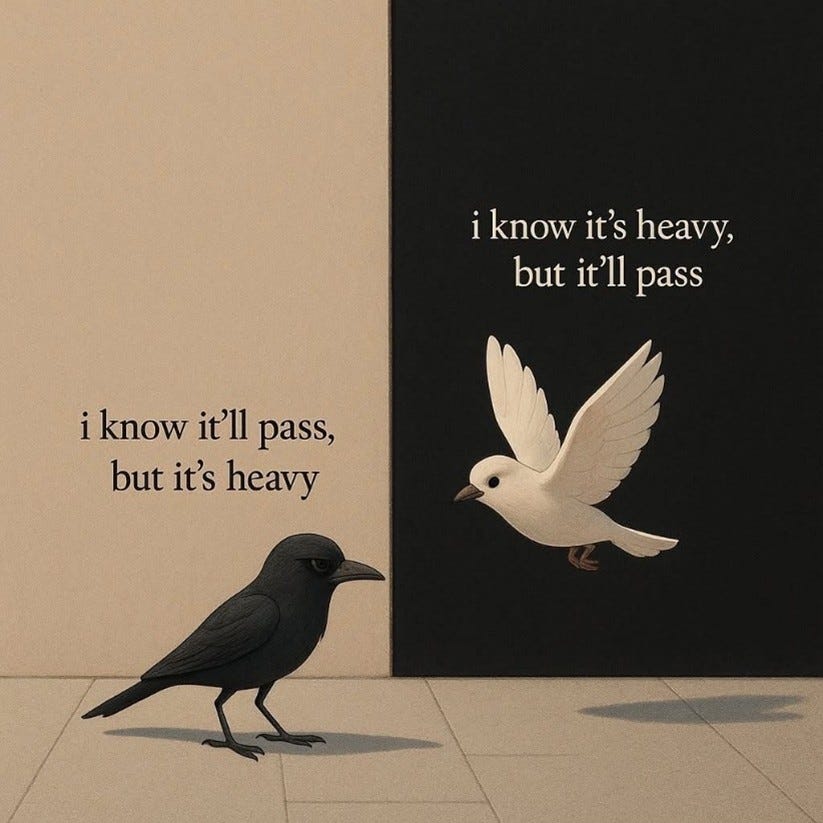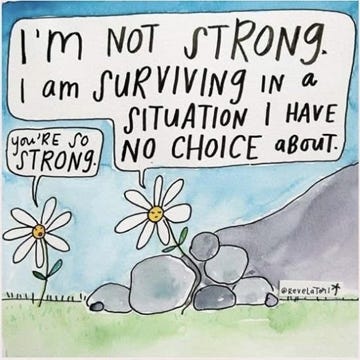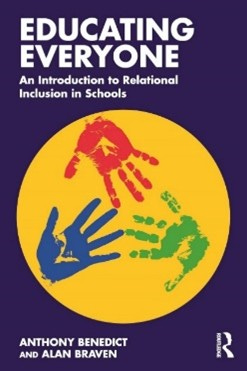Relational Inclusion Blog #28
Automatic Negative Thinking
In other news, my little boy broke his arm for the second time in two months.
I mean, the positives are he was out of plaster following his first break, just in time for his birthday and the soft play we had booked; he was out of plaster when we went abroad, and he had two weeks in the sun and was able to play in the pool and in the sea.
As I reread and reflect on this paragraph, it makes me smile. Relational Inclusion has helped me train myself to look first for the positives - I do this quite naturally now it seems. Once upon a time I would only have seen the struggle and the negatives, the bad omens would have overshadowed anything else. A bit like only remembering when you drop toast and it lands buttered side down.
I don’t think this is rose tinted spectacle thinking. As Brene Brown says:
All I know is that my life is better when I assume that people are doing their best. It keeps me out of judgment and lets me focus on what is, and not what should or could be.
However, we landed back in England on the Friday, by Sunday- roughly 7pm - I heard him crying in the garden. This was almost exactly two months to the day and hour of the original break.
I found him lying face down and his sister, who was first to arrive, had his head in her lap.
When I got there, he looked at me in that trusting and hopeful yet slightly sad way that only a five-year-old can. His eyes were saying all sorts of things that he didn’t have the words for, and he said, “Is it broken?”
And he held up his arm.
It was bad. It was really bad. It’s possibly the worst break I’ve seen up close. His arm was like spaghetti.
I picked him up and cradled him and shouted for my wife.
Roughly 15 minutes later I stood in the bathroom alone.
He was in a taxi with his mum on the way to A&E. My daughters had disappeared next door for movie night.
And I stood there - in this funny place of silence.
I knew my nervous system was all over the place and I didn’t quite know what to do. My instinct was to grab a beer or a glass of wine or both but at some point, I might have needed to drive. I’m worried for his arm. I’m worried the doctors will say something awful. I hoped my wife was in a good enough state to ask for a second opinion should it come to it.
I imagine hundreds of children in Manchester alone have done something similar over the last six weeks and it is only a break. Why was I thinking he might lose his arm? This is classic automatic negative thinking. It can be traced back to our survival instinct:
The brains of humans and other animals contain a mechanism that is designed to give priority to bad news. By shaving a few hundredths of a second from the time needed to detect a predator, this circuit improves the animal’s odds of living long enough to reproduce. (Kahneman)
When we were hunters, these instincts served us well. They’re not so helpful now. I’m worried that a second break on the same arm - and a very slight black eye (caused by our garden swing catching him the face)- might be a red flag for the hospital who might have to alert social services.
I’m worried about racial profiling. My wife is dual heritage, and she is fortunate enough to look much younger than she is. When she goes to return items to high street shops, usually with our three children, she is often – there is no easy way to say this – judged. For some reason staff mis-read her age, look down at her for being so young and having three children and then are often mistrustful of her intentions. I am worried that the same will happen at the hospital with her and my son.
And this is one of the interesting things about my journey down the relational inclusion pathway. I now know how to interpret my senses, I can read my emotions as they happen, and I understand the effect that this is having on my nervous system and yet I still find myself in a place where I can practice the pause so that I don’t react however I still don’t quite know what to do.
So, at 7.30 in the evening, I decided to shave and shower whilst imagining the headlines:
5-year-old boy in A&E with broken arm and black eye whilst CEO - apparently all about relational Inclusion - takes a shower
And I wonder about this world we live in, the pressure we put on ourselves and the pressure we put on each other.
The quotes I thought worth sharing this week are:
1) If people stopped looking for things that offended them and started looking for things that inspired them, what a wonderful world this would be. (Unknown)
2) When you lift weights,
You’ll often feel weaker
Before you feel strong.
When you learn something new,
You’ll feel foolish
Before you feel smart.
When you invest,
You’ll feel broke
Before you feel wealthy.
That’s the nature of growth,
Do the hard things anyway.
Everyday. (D. P Mapfeka)
3) I will not be a mystery to my children. They will know me and I will share my stories with them – the stories of failure, shame and accomplishments. They will know they’re not alone in that wilderness. (@violadavis)
4) You can’t YELL, SCARE or THREATEN a child into feeling calm (Neurowild)
5) Children learn emotional regulation by watching us handle our own emotions with care and compassion. (Carolina King / Mama instincts)
6) You cannot swim for new horizons until you have courage to lose sight of the shore. (William Faulkner)
7) I’m fixing me. Because sometimes I’m the problem (unknown)
My two print and stick to the wall images this week are:
My recommended read is about the Nervous System Check-In:
The 3 Quick Swallow Test
Did you know there’s a simple way you can tune in to see if your nervous system may be dysregulated?
It’s called the 3 Quick Swallow Test.
Here’s how it works:
👉 Take three quick swallows in a row without pausing.
👉 Pay attention to how it feels in your throat and body.
What to Notice
• If the swallows feel smooth and coordinated, your system is likely in a more regulated state.
• If you notice difficulty—like catching, tightening, or feeling like the swallows “stick”—this may be a sign that your vagus nerve and parasympathetic system are under stress.
Why does this matter?
Your swallow reflex is closely tied to the vagus nerve, the same nerve that helps you shift into rest and digest.
When your body struggles with this simple reflex, it can be a clue that your nervous system is carrying tension or stuck in a dysregulated state.
💡 What You Can Do
The good news is—awareness is the first step! Once you notice signs of dysregulation, you can gently invite your system back into balance with simple practices.
~ Phyllis Terry, Vagus Nerve Stimulation Activity Group
If you find the Relational Inclusion blog useful, feel free to share with your networks.
Our book, Educating Everyone: An Introduction to relational Inclusion in Schools is out now and you must buy it and tell everyone else to buy it. It is available pretty much everywhere that sells books or you can get it here: Educating Everyone
Finally, I’d like to share a quote which has really stuck in my mind:
9) It’s not about feeling better. It’s about getting better at feeling (Gabor Mate)
Thanks for reading
Anthony Benedict
CEO Ambition Community Trust
Previous blogs can be viewed or downloaded as PDFs from here: Blog Archive






